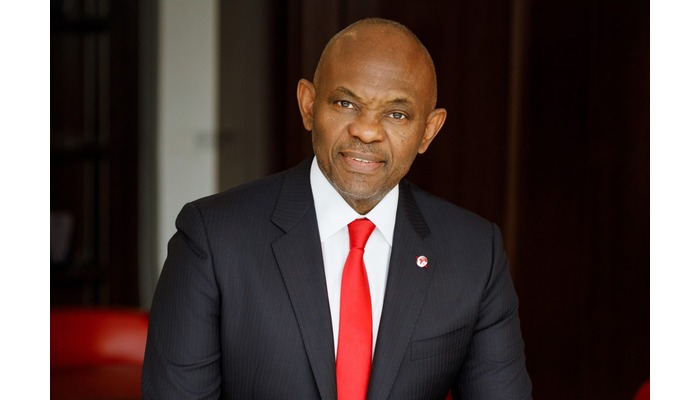……Calls on government, private sector to ensure AI drives productivity
Washington, D.C|| Tony Elumelu, founder and chairman of Heirs Holdings, has emphasised that Africa needs trust, accountability, and sound governance to unlock and mobilise its over $4 trillion in domestic capital.
He made this call on Wednesday during a panel session on “Boosting Productivity Growth in the Digital Age” at the ongoing Annual Meetings of the World Bank and the International Monetary Fund (IMF) in Washington, D.C., where he also urged both governments, institutions and the private sector to collaborate in ensuring that artificial intelligence (AI) becomes a tool for driving productivity rather than widening inequality.
Elumelu explained that although Africa is rich in domestic capital, much of it remains dormant due to a lack of trust and accountability in governance. According to him, digital inclusion is key to achieving economic inclusion, and governments must take deliberate steps to create an enabling environment that allows private capital to serve the people effectively. “Africa has over $4 trillion in domestic capital, but we need trust, accountability, and sound governance to mobilize it effectively. Digital inclusion is economic inclusion. Governments must create an enabling environment and ensure that private capital serves the people,” he said.
He noted that true productivity in Africa goes beyond economic output to include opportunities for individuals to thrive. “When we talk about productivity today, it’s really about people. Productivity is not just about output per worker; it’s about opportunity per person,” he said. Elumelu added that Africa has a history of leapfrogging technological stages and that the digital age presents an even greater opportunity to accelerate development, particularly in key sectors such as healthcare, agriculture, and electricity.
However, he warned that for Africa to seize this opportunity, it must address deep-rooted structural challenges. He pointed out that the continent’s infrastructure deficit, especially inadequate access to electricity, remains a major obstacle to harnessing the full potential of AI and digital productivity. “We also face challenges with access to capital, which affects entrepreneurs in the AI space. We need what I call a combination therapy to tackle these challenges, massive, deliberate investments in AI and in the infrastructure that unleashes its capabilities,” he said.
Read also: IMF projects Nigeria’s debt-to-GDP ratio hit 36.4% by 2025, 35% by 2026
Elumelu highlighted the efforts of the Tony Elumelu Foundation in equipping young African entrepreneurs with digital tools through collaborations with partners such as Google. He described Africa’s youth as energetic and innovative but constrained by barriers that limit their ability to participate fully in the digital economy. According to him, “Supporting them not only improves productivity globally but also ensures that AI does not worsen inequality. Without deliberate investment in digital infrastructure, AI could actually deepen inequality. That is why partnerships between organisations like Google, our foundation, and others are essential to drive inclusion and efficiency.”
He reminded the audience that Africa’s history proves that innovation can thrive even in challenging environments, citing the success of mobile money as a landmark example of how African entrepreneurs turned limitations into opportunity. “The mobile money revolution is a prime example, it succeeded not because systems were perfect, but because entrepreneurs innovated within limitations. That’s why I call on everyone, governments, the private sector, development partners, and global institutions like the IMF, to work together to make AI’s productivity gains inclusive, so prosperity is democratised and not limited to a few,” he stated.
In her remarks, Kristalina Georgieva, managing director of the IMF, acknowledged the growing gap in AI readiness between developed and developing countries. She revealed that the IMF has developed an AI Preparedness Index that measures countries’ readiness based on digital infrastructure, labor skills, innovation, and regulatory environment. “The gap in AI readiness across countries is, unfortunately, very wide. Advanced economies score high, while developing and low-income countries lag far behind. For developing countries, the key issues are infrastructure and skills. For example, half of Africa’s population still lacks access to electricity, which makes AI adoption almost impossible,” she said.
Georgieva disclosed that AI will significantly impact global labour markets, with 60 percent of jobs in advanced economies, 40 percent in emerging markets, and 26 percent in low-income countries expected to be affected. She warned that while AI is transformative, its benefits could easily deepen inequality if proactive measures are not taken. “It’s a massive transformation of the labor market, a tsunami we are not yet prepared for. AI is transformative, but without proactive measures, it could make inequality worse,” she cautioned.
She stressed that the main challenge lies in ensuring that AI creates new, high-quality jobs rather than displacing existing ones, particularly for workers without advanced degrees. “Educated workers fear that AI will replace them, especially in coding and creative industries. While automation could displace millions of jobs, the challenge is to create new, high-quality jobs accessible to people without advanced degrees. Unless AI enhances the productivity of less-skilled workers, inequality will widen,” Georgieva said.
She urged governments to reform education systems to make them more adaptive and focused on lifelong learning. “It’s no longer about what subject you study but about your ability to learn new skills continuously,” she explained. She added that small and medium-sized enterprises, which employ the majority of workers in developing economies, must be supported to adopt AI and digital technologies.
Georgieva further emphasised the importance of regulation and ethics in shaping AI’s future, calling for policies that both encourage innovation and guard against potential risks. “We must mitigate the downside risks of AI, inequality, polarisation, and misuse, while ensuring regulation does not stifle innovation. Pro-innovation policies, R&D support, and public-private partnerships are key. We must protect against harm but enable progress,” she said.
Both Elumelu and Georgieva agreed that Africa’s path to inclusive digital productivity depends on strong collaboration, trust, and accountable governance that ensures technology serves people and promotes shared prosperity.

